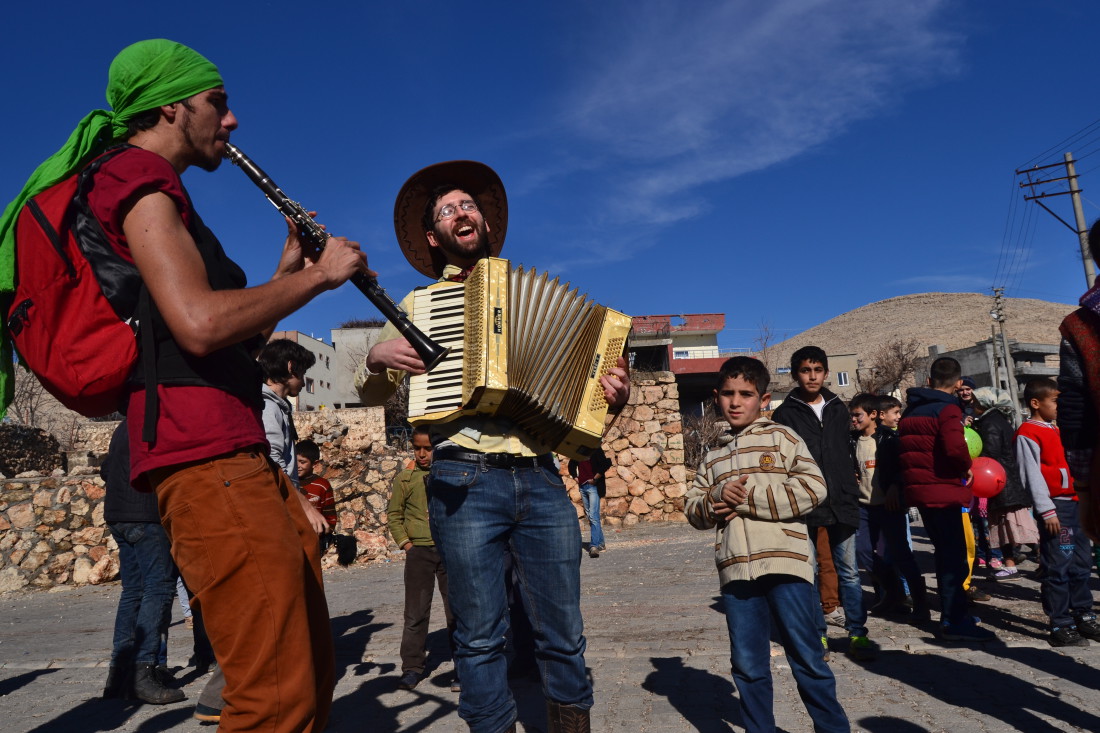Owen Harris thought he was booked to perform a 45-minute set. It was November 2015, and the musicians he was scheduled to play with were strangers. Harris himself was relatively new to the area — having arrived to Istanbul, six months earlier, by way of Asheville. He’d left the U.S. to work for Humanwire, an organization that helps individuals make direct monetary donations to Syrian and other refugee families in Turkey and Lebanon. He played music on the side.
The 45-minute set turned out to be a three-hour performance. “We ran out of songs,” says Harris. The room quieted. In a last-ditch effort to fill the void, Harris threw out the chords to the Hank Williams chestnut “Hey Good Lookin.” The band jumped in, and the rest of the evening was spent covering country songs (with some Arabic flair).
This near-debacle turned out to be the origin of Country for Syria, an Istanbul-based international collective. The nine-piece band consists of three Syrians, two Americans, two Turks, a Spaniard and a Frenchman. The group is embarking on its first U.S. tour, scheduled to play two shows in Asheville — Tuesday, Oct. 25, at The Toy Boat Community Art Space and Wednesday, Oct. 26, at The Mothlight. The group will also hold a workshop at Warren Wilson College prior to its Wednesday performance.
The concerts will showcase the band’s blend of traditional Middle Eastern music with American country. The workshop at Warren Wilson will involve a short set, along with a post-performance Q&A. Harris views the workshop as a way to discuss the overlap between the two styles. “Country music has its origins in the American Civil War,” he says. “And Syria is in the midst of a civil war now. A lot of Arabic folk music is about the relationship to place, the relationship to your community, the relationship to religion, to your God and things about geographic features, rivers, mountains — just like country music does.”
The similarities, Harris adds, go far beyond lyrical motifs. In Western North Carolina in particular, Harris sees a history that mirrors Syria’s present day. “Appalachia was a poor region, a working-class region,” he says. “There was a lot of migration, a lot of moving around, a lot of insecurity. A lot of these things are what Syrian folks are going through now.”
Harris hopes the shared experiences will help reshape American views of Syrian refugees. Early on, during the crisis, he remembers support and a positive dialogue coming from the U.S. “I felt like there was solidarity,” he says. “But as the election season has worn on, the dialogue around the refugee crisis has really turned quite toxic and xenophobic.”
In addition to highlighting the commonality between the two nations, the tour will double as a fundraiser for Syrian refugees. At each show, concertgoers will have the opportunity to donate funds to a specific Syrian family.
The tour also functions as a case study on the immigration process. Harris emphasizes the obstacles his band members have had to navigate to obtain travel visas to the U.S. “People feel insecure … like refugees are pouring into the Untied States,” he says. “It’s actually very very difficult to get Syrian refugees into the [country].” Letters of recommendation, letters of invitation, school transcripts from elementary through university and numerous fees have all been part of the undertaking.
“Sometimes politicians make it sound like the vetting process for people coming into the U.S. is not thorough,” Harris continues. “When actually, it’s quite intense.”
For Harris, the Asheville visit is a homecoming. He graduated last year from Warren Wilson, where he studied modern languages and political science. He’s excited to bring the band’s message back to the mountains. “There’s this big crisis going on,” he says. “[It’s] this big tragedy that … people back home really aren’t aware of, or, for them it’s a political issue or they don’t want to accept these people as people.”
He adds, “I felt like the best way to counter that was to come to the U.S. with Syrian refugee musicians and show that our cultures are compatible. These are normal people who do normal things.”




Before you comment
The comments section is here to provide a platform for civil dialogue on the issues we face together as a local community. Xpress is committed to offering this platform for all voices, but when the tone of the discussion gets nasty or strays off topic, we believe many people choose not to participate. Xpress editors are determined to moderate comments to ensure a constructive interchange is maintained. All comments judged not to be in keeping with the spirit of civil discourse will be removed and repeat violators will be banned. See here for our terms of service. Thank you for being part of this effort to promote respectful discussion.